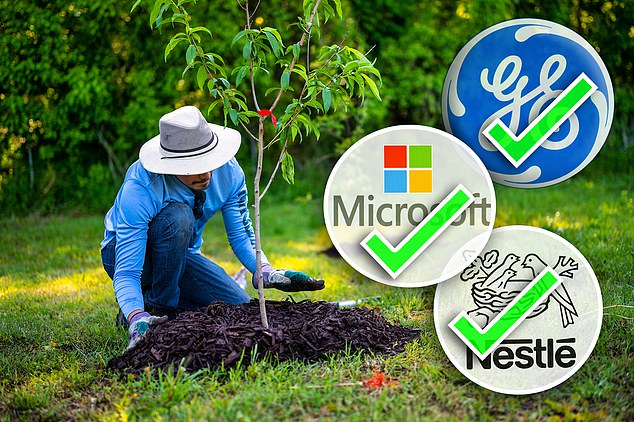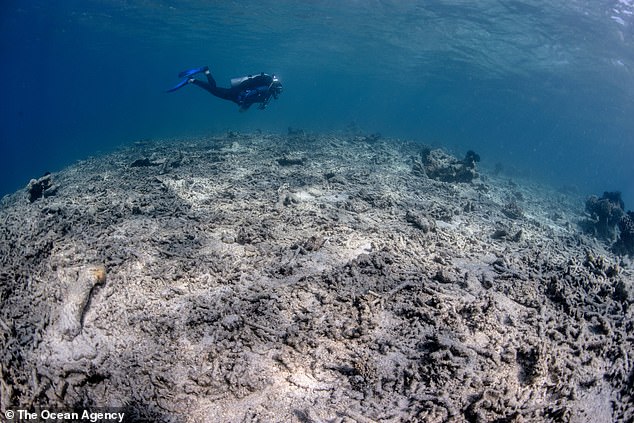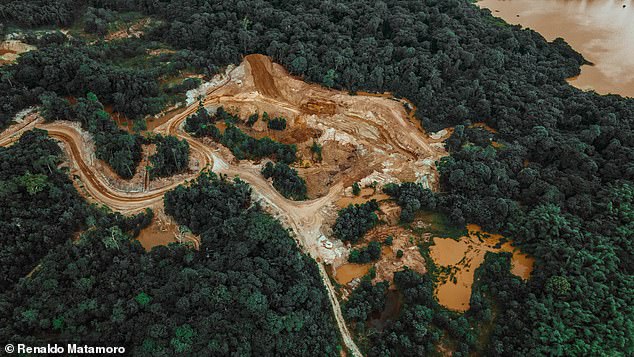Greenwashing corporations exposed: Over 90% of companies claim to plant trees, regrow coral or restore other ecosystems but DON’T publish reports on ANY results
Hundreds of major multinational corporations are talking about environmental stewardship and promising to help restore ecosystems plundered for profit.
But only a select few – less than 10 percent – have come close to proving that their company is actually ‘leading by example’ by issuing detailed reports to shareholders and the public.
A new report has been published found that a third of 100 company files studied did not disclose the scope of their “ecosystem restoration” projects and nearly 80 percent did not provide hard financial data on their company’s conservation efforts.
Some ostensibly eco-friendly multinationals, including BP, Apple and Johnson & Johnson, have been particularly quiet about the details of their environmental contributions, despite having such eco programs in the first place.
Although a few companies, including Nestlé, Microsoft and General Electric, were much more forthcoming with details in their annual reports, researchers found that these companies were outliers.
A whopping 90 percent of companies, all selected from the 2021 Forbes Global 500 list, failed to publicly report on even one environmental outcome, whether touting a success or admitting of failure.
The lack of transparency exposes many of these giant companies to accusations of “greenwashing” – a public relations gambit by notorious corporate polluters in an attempt to cleanse their image more than any part of nature.
A new report in Science focused on sustainability reports published by 100 companies from the 2021 Forbes Global 500 list. Some ostensibly eco-friendly companies, such as BP, Apple and Johnson & Johnson, were quiet on the details even though they had such environmental programs in the first place

But a few companies, including Nestlé, Microsoft and General Electric, were much more forthcoming with details in their annual reports, researchers found
The statistics come from a new report, conducted by scientists working together at multiple universities in the US, UK and Europe, which was published on Thursday Science.
As noted by the report’s lead author, marine biologist Tim Lamont, all of the company’s environmental restoration projects, regardless of quality or sincerity, were volunteer efforts that went beyond their legal obligations.
“We have identified that corporate reporting is currently underperforming and needs improvement, yes,” Lamont told DailyMail.com.
“But we also found that two-thirds of the world’s largest companies are trying to restore ecosystems, which is encouraging.”
However, even the most conscientious and transparent business actors, as shown by the team’s analysis, had room for improvement.
For example, Nestlé and Microsoft both earned high marks for producing reports providing information on the ecological results of their projects and updates on their efforts to monitor the success or failure of their eco-restoration work.
But neither disclosed financial information, such as the total budget of their green projects or the per-line cost of their efforts to restore the once-pristine wilderness to its natural state.
“No company reported perfectly across the board,” Lamont told DailyMail.com.
Lamont, whose focus is on coral reef ecology and restoration at Lancaster University, along with his colleagues at Cambridge, Northern Illinois University and elsewhere, focused on several key reporting principles as he reviewed the company’s reports.
The key questions were: Has a company reported the total area reforested through its tree planting efforts? Did the company specify which region of the country or marine ecosystem the project would focus on?
“No company reported in accordance with all principles,” Lamont noted, “but all principles were reported by at least one company.”
However, several major companies failed to tick quite a few boxes.

Even highly transparent eco-advocates, such as Nestlé and Microsoft, have not publicly disclosed any financial information, such as the total budget of their green projects or the per-line cost of efforts to restore once-pristine wilderness to its natural state. Above damaged coral in Indonesia

Key questions too often remained unanswered in the companies’ reports: Was the total area reforested by the tree planting efforts? Did the company specify which region of the country or marine ecosystem the project would focus on? Above deforestation in Trinidad and Tobago
Costco Wholesale, Ford Motor, IBM, and BP all failed to report the geographic scope and financial budget of their purported ecosystem revitalization work, and also failed to report any positive or negative results from any outcome monitoring.
Even tech giant Apple, with its ‘feel good’ public image, public climate goals And financing accelerators for environmental innovationfailed to report the acreage of its recovery or conduct any publicly reported ecosystem monitoring of its success.
Worse, all 100 of the 2021 studies by Lamont and his colleagues at the Forbes Global 500 company failed to report on the local human and economic impact of their programs on the populations in and around the regions that need to be restored and rewilded.
In short, heal healthcare companies appeared particularly uninterested in financing ecological programs.
None of the big companies like Johnson & Johnson, Cigna, and CVS Health even had a program to restore plundered ecosystems.
“Energy and materials companies are perhaps the most involved in recovery because they have clear direct environmental impacts that they are trying to take into account,” Lamont told DailyMail.com, although he admitted he could only speculate.
‘The opposite may be true for healthcare companies, but we don’t know for sure. In this article we only directly evaluated the reporting, not the motives or objectives.’
Despite these criticisms and the questions they raise about corporate greenwashing and disingenuous PR, Lamont is encouraged by the fact that major corporations are voluntarily funding efforts to revitalize forests, coral reefs and other ecosystems at all.
“With some improvements in the way they report, big companies can be a real force for good in this area and have a major positive impact on the challenge of restoring the world’s degraded ecosystems,” he said.
“This potential promise is important and gives us the motivation to get this right.”
